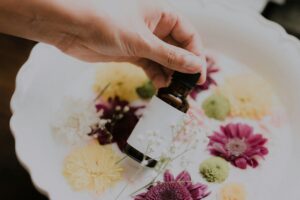Niacinamide: A Skincare Ingredient that Needs more Attention – Complete Guide
Niacinamide is added to a lot of skincare products, but is it worth the hype?

Skincare ingredients get attention when they want to, but niacinamide has been around for years and has been heavily studied. Here is your complete guide to this ingredient!
Find out if niacinamide deserves to be called a hero ingredient, or if the claims are all hype and no substance.
What is Niacinamide
Niacinamide, a form of niacin, is also called Vitamin B3. It is an essential vitamin to how we function. It is used by the body to maintain healthy cells.
Benefits of Niacinamide for the Skin
Niacinamide is very helpful in treating acne, dark spots, and hyperpigmentation. It is an anti-inflammatory ingredient, which can be helpful in calming redness in rosacea and reducing inflammation caused by acne. The repair of the skin barrier can also help in reducing redness overall in the skin.
This ingredient also can reduce hyperpigmentation and dark spots in the skin by preventing excessive production of melanin.
Another interesting property of niacinamide is that it boosts ceramides in the skin. Think of your skin cells as bricks and ceramides as the concrete that holds them together. Ceramides help the skin form the barrier.
It can be used on the eye area and neck as it is not irritating, and can even help support collagen production in the skin. Some even claim that eating it in the form of niacin can be helpful for diabetes, reduce cancer, and treat cholesterol. Is any of this true? Let’s check the science.
Is There Science Behind This Ingredient?
There are extensive studies that look at the effect of this ingredient on the skin. The important aspect science looks at is the question does this ingredient penetrate the skin to be effective. At the cellular level, it acts as an antioxidant, it decreases inflammation, reduces hyperpigmentation, and reduces water loss from the skin.
Many studies have found it to improve skin appearance by activating collagen production and reducing fine lines.
Furthermore, It suppresses melanosomes, which causes dark spots. There are also studies that state it controls oily skin and balances the barrier.
An interesting study found that taking this ingredient orally could potentially help reduce the risk of skin cancer in patients that had skin cancer in the past, though much more research is needed.
How to Niacinamide in Skincare Effectively
Use this as a part of your everyday skincare routine. Niacinamide is in many products, from serums to moisturizers, to lotions. It is a very versatile ingredient that can be layered with many other active ingredients with great benefits.
You can use it as a prepping ingredient that supports and maintains healthy skin to prepare the skin for stronger ingredients like retinol.
Plus, there are also benefits to eating it in the form of niacin. Plus, excess niacin in the body is then converted into niacinamide.
Foods with B3 (Niacin)
Niacinamide is found in foods such as meat products like beef, poultry, and fish, and brown rice, nuts, seeds, legumes, and bananas. Supplements are an option, but natural sources are better.
However, if you need more B vitamins, something like nutritional yeast can be a great, natural way to increase consumption! It is very easy to add to soups, smoothies, or salads.
Niacin Benefits
Consuming vitamin B3 may help regulate cholesterol, reduce triglycerides, and may lower the risk of diabetes. Taken orally or applied as a lotion, B3 can even protect the skin cells from UV sun damage. Therefore, it is a great idea to consume foods with B3, or use a natural supplement like nutritional yeast to get all your B vitamins!
What can be Combined with Niacinamide
Here are skincare ingredients that may be combined with this hero ingredient! May products have more than one active ingredient, and since niacinamide is very easy to formulate, you can look for products with combinations of actives.
Glycolic acid and Niacinamide
Yes, but with caution. They may complement the effects of each other on the skin, brightening and increasing skin health, but use caution. Too many actives may irritate.
Lactic acid and Niacinamide
Yes, you can use both. Lactic acid is a gentle exfoliating ingredient and niacinamide can improve the skin barrier greatly.
Retinol and Niacinamide
When using these two together, it is an incredible partnership. Niacinamide helps restore the skin barrier, improving hydration and calming the skin. This can help reduce any potential side effects from retinol like dryness or flakiness.
Vitamin C and Niacinamide
These can be combined well, especially if you are worried about dark spots or sun damage.
Hyaluronic Acid and Niacinamide
Yup. In fact, niacinamide may protect against water loss vehicle hyaluronic acid increases skin moisture.
Niacinamide Side Effects
This ingredient is usually safe for everyone to use. If you have an allergic reaction, you may want to patch test first, as this ingredient causes the body to release histamine.
Mild Burning
You may experience mild heat or slight burning, but this may be due to other ingredients besides niacinamide. Try to avoid harsh ingredients like fragrance in your products. If mild burning occurs, cease use.
Mild Redness
Niacinamide should reduce redness, but this may not always be the case. Using too high concentrations of niacinamide may momentarily cause redness in the face. Niacinamide benefits can be seen at low concentrations, usually less than 5%, so do not think you need high concentrations to gain healthier skin.
Mild Itching
Do not use high concentrations of niacinamide if you are prone to allergic reactions as this may cause mild itching.
The Takeaway
This is an amazing ingredient for the skin! Niacinamide can reduce acne, control oil production, increase moisture in the skin, reduce water loss, increase collagen and ceramides in the skin, reduce hyperpigmentation, and even protect against sun damage.
In other words, it deserves a nickname like a hero ingredient! This ingredient is very well tolerated by individuals with sensitive skin, as it can calm the skin, reduce redness, and decrease inflammation. It can protect the skin if you use harsher and stronger ingredients like retinol and can maintain a healthy skin barrier.
Remember, skincare is about progress, not perfection. Take steps to improve the skin for the sake of health as well as aesthetics.





